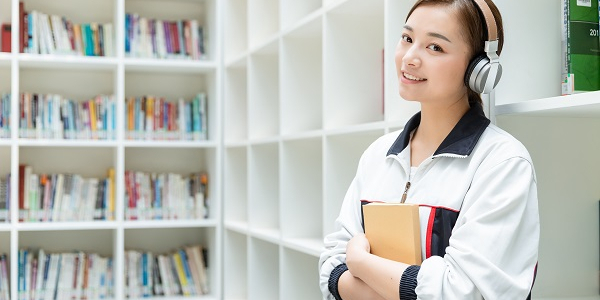北京市东城区2017-2018学年第二学期高三综合练习一英语试卷及答案出来了,小编现将北京市东城区2017-2018学年第二学期高三综合练习一英语试卷及答案整理出来分享给同学们,需要对照英语答案的查看以下文章吧。首先分享的是试卷部分,随后会将答案地址分享出来。

北京市东城区2017—2018学年度第二学期高三综合练习(一)
2018.4
英 语
本试卷共120分。考试时长100分钟。考生务必将答案答在答题卡上,在试卷上作答无效。考试结束后,将本试卷和答题卡一并交回。
第一部分:知识运用(共两节,45分)
第一节 单项填空(共15小题;每小题1分,共15分)
从每题所给的A、B、C、D四个选项中,选出可以填入空白处的较佳选项,并在答题卡上将该项涂黑。
例:It’s so nice to hear from her again. _____, we last met more than thirty years ago.
A.What’s more B.That’s to say
C.In other words D.Believe it or not
答案是D。
1. Scientists are building a powerful instrument, which ______ them see deep into space.
A. has helped B. will help C. helped D. would helped
2. Large groups that want to visit the museum have to get permission ______ they visit.
A. unless B. where C. as D. before
3. Since 18th January, 2018, some airlines in China ______ mobile phone use on their aircrafts.
A. allow B. allowed C. have allowed D. had allowed
4. The dictionary has 100 new words _________ into its latest edition.
A. add B. adding C. added D. being added
5. Moving abroad means entering a culture ______ the customs and the language are different.
A. where B. when C. which D. whose
6. —Could you tell me ______ the train from New York will be arriving on time?
—Yes, sir. It should be arriving in 10 minutes.
A. when B. how C. why D. if
7. The snowstorm ______ several days before it hit the northern areas.
A. would predict B. had predicted C. would be predicted D. had been predicted
8. I ______ not have her new telephone number; let me check.
A. may B. must C. shall D. need
9. Once Jason becomes interested in some topic, he can’t help thinking about it ______ he goes.
A. however B. wherever C. whenever D. whomever
10. The book ______ next year is supposed to be a best-seller.
A. publishing B. being published C. to be published D. to have published
11. The trouble is ______ we can reach the conference center within twenty minutes in the rush hour.
A. what B. how C. when D. why
12. Mike hasn’t appeared for two weeks, ______ his friends are wondering what has happened to him.
A. so B. but C. or D. for
13. Electric cars produce about 80 percent less pollution than cars ______ gas-powered motors.
A. from B. by C. for D. with
14. ______ that he had fallen behind, Peter started to quicken his pace.
A. Realized B. To realize
C. Having realized D. Having been realized
15. Can you imagine what the modern world ______ like without smartphones?
A. were B. would be C. had been D. would have been
#p#副标题#e#
第二节 完形填空(共20小题;每小题1.5分,共30分)
阅读下面短文,掌握其大意,从每题所给的A、B、C、D四个选项中,选出较佳选项,并在答题卡上将该项涂黑。
My brother Gene was four years older than me. By the time I turned four, I was upset that he could read but I couldn’t. I burned with 16 to read a book like my brother. I begged: “Teach me to read, Mom! Please, please?!” Finally, Mom set aside time after lunch 17 reading lessons, and soon after my fifth birthday, I was reading.
I longed for my father, who was a great storyteller, to read me the books that I couldn’t yet read on my own. But my father worked three jobs to feed the family. He didn’t have the time or 18 in the evening to read to me. 19 , every Sunday morning, my brother and I lay next to him in bed, waiting for him to tell stories about his 20 . I can still hear my father’s voice 21 the cold winters on the family farm in Poland. His family didn’t have enough money to burn wood in the fireplace all night. He told us that he always volunteered to help with 22 . I can smell the soup made by my grandma and 23 my father cutting onions, carrots and tomatoes for salad, and when no one was looking, putting a piece into his mouth. “I was always 24 ,” he explained. Hearing my father’s stories 25 me closer to the books and the stories they held.
One Saturday afternoon when I was seven, we walked two blocks to the small 26 in our neighborhood, and my dad filled out forms for a card. That Saturday 27 my life: I met Mrs. Schwartz, the librarian, and my dad said, “You’re 28 enough to walk to the library yourself.” And so I did—almost every afternoon.
In my mind, Mrs. Schwartz was “the keeper of books and the guardian of stories.” Some days she read aloud to a small group of us 29 . Most of time, Mrs. Schwartz let me 30 myself with books I pulled from the shelves and look through them to see which ones I’d 31 out. I remember that sometimes she’d 32 a book and tell me a part of the story. But she always let me choose. Books became my 33 who were my comfort when I felt lonely.
Yes, reading changed me. It gave me the 34 to study hard so I could become a teacher, and share my 35 of reading with my students. And inside my head, I can still hear the voices of my mother, father, and Mrs. Schwartz, which are with me every time I open the first page of a new book. 428
16. A. anger B. worry C. desire D. interest
17. A. for B. before C. in D. until
18. A. ability B. ambition C. courage D. energy
19. A. Still B. Then C. Therefore D. Finally
20. A. workplace B. childhood C. farmland D. neighborhood
21. A. explaining B. describing C. introducing D. interpreting
22. A. living B. reading C. farming D. cooking
23. A. catch B. discover C. notice D. picture
24. A. busy B. poor C. hungry D. tired
25. A. laid B. drew C. taught D. left
26. A. library B. bookstore C. office D. club
27. A. saved B. changed C. tested D. controlled
28. A. near B. ready C. old D. free
29. A. graduates B. regulars C. candidates D. communicators
30. A. surround B. familiarize C. examine D. reward
31. A. find B. lend C. check D. sign
32. A. write B. recommend C. study D. reserve
33. A. teachers B. assistants C. listeners D. companions
34. A. drive B. dream C. order D. chance
35. A. lesson B. time C. love D. plan
#p#副标题#e#
第二节 完形填空(共20小题;每小题1.5分,共30分)
阅读下面短文,掌握其大意,从每题所给的A、B、C、D四个选项中,选出较佳选项,并在答题卡上将该项涂黑。
My brother Gene was four years older than me. By the time I turned four, I was upset that he could read but I couldn’t. I burned with 16 to read a book like my brother. I begged: “Teach me to read, Mom! Please, please?!” Finally, Mom set aside time after lunch 17 reading lessons, and soon after my fifth birthday, I was reading.
I longed for my father, who was a great storyteller, to read me the books that I couldn’t yet read on my own. But my father worked three jobs to feed the family. He didn’t have the time or 18 in the evening to read to me. 19 , every Sunday morning, my brother and I lay next to him in bed, waiting for him to tell stories about his 20 . I can still hear my father’s voice 21 the cold winters on the family farm in Poland. His family didn’t have enough money to burn wood in the fireplace all night. He told us that he always volunteered to help with 22 . I can smell the soup made by my grandma and 23 my father cutting onions, carrots and tomatoes for salad, and when no one was looking, putting a piece into his mouth. “I was always 24 ,” he explained. Hearing my father’s stories 25 me closer to the books and the stories they held.
One Saturday afternoon when I was seven, we walked two blocks to the small 26 in our neighborhood, and my dad filled out forms for a card. That Saturday 27 my life: I met Mrs. Schwartz, the librarian, and my dad said, “You’re 28 enough to walk to the library yourself.” And so I did—almost every afternoon.
In my mind, Mrs. Schwartz was “the keeper of books and the guardian of stories.” Some days she read aloud to a small group of us 29 . Most of time, Mrs. Schwartz let me 30 myself with books I pulled from the shelves and look through them to see which ones I’d 31 out. I remember that sometimes she’d 32 a book and tell me a part of the story. But she always let me choose. Books became my 33 who were my comfort when I felt lonely.
Yes, reading changed me. It gave me the 34 to study hard so I could become a teacher, and share my 35 of reading with my students. And inside my head, I can still hear the voices of my mother, father, and Mrs. Schwartz, which are with me every time I open the first page of a new book. 428
16. A. anger B. worry C. desire D. interest
17. A. for B. before C. in D. until
18. A. ability B. ambition C. courage D. energy
19. A. Still B. Then C. Therefore D. Finally
20. A. workplace B. childhood C. farmland D. neighborhood
21. A. explaining B. describing C. introducing D. interpreting
22. A. living B. reading C. farming D. cooking
23. A. catch B. discover C. notice D. picture
24. A. busy B. poor C. hungry D. tired
25. A. laid B. drew C. taught D. left
26. A. library B. bookstore C. office D. club
27. A. saved B. changed C. tested D. controlled
28. A. near B. ready C. old D. free
29. A. graduates B. regulars C. candidates D. communicators
30. A. surround B. familiarize C. examine D. reward
31. A. find B. lend C. check D. sign
32. A. write B. recommend C. study D. reserve
33. A. teachers B. assistants C. listeners D. companions
34. A. drive B. dream C. order D. chance
35. A. lesson B. time C. love D. plan
#p#副标题#e#
B
Most kids love breaks, but for Hannah Kristan, a break was her least favorite part of the school day. “I never got to do anything except sit there,” she recalls.
Hannah was born with a disease that kept the bones in her back from forming properly. She uses a wheelchair. Sadly, for kids like her, most playground equipment is off limits. In fact, Hannah is one of 5 million kids in the United States who cannot use traditional playground equipment because of some type of disability.
Then Hannah heard about Boundless Playgrounds—playgrounds without limits for children with disabilities. The wonderful group behind Boundless Playgrounds helps communities create special playgrounds for children of all abilities. There are swings and sandboxes specially designed for kids with physical disabilities. Kids with vision problems can enjoy the movement of swings and also use musical activities such as chime walls. Since her hometown in Connecticut had nothing like it, Hannah helped raise money for this new kind of playground.
The inspiration for Boundless Playgrounds was a playground created by Amy Jaffe Barzach. It is named Jonathan’s Dream in honor of her son. Jonathan’s Dream and many Boundless Playgrounds around the country have a glider swing that can be used by kids who use wheelchairs and their friends. The glider swing at Jonathan’s Dream was designed by Matthew Cavedon, who wasn’t even 10 years old at the time. Matthew was motivated because he used a wheelchair himself and wanted to be able to have fun at playgrounds with other kids, regardless of their physical abilities or disabilities.
The basic idea behind Boundless Playground is that play is both part of the joy of childhood and an important way for children to learn about the world. Kids who are kept away from playgrounds are denied this enjoyment as well as the learning. Far from being a place of happy excitement, traditional playgrounds are often places of separation and loneliness for those who can’t join in the fun.
Contrary to some strict ideas about what a playground for children with special needs should be like, a Boundless Playground is every bit as colorful and challenging as a traditional playground. That’s why it is inviting and fun for all children. And for Hanna, Matthew, and other kids like them, a playground like this is also a dream that comes true.
40. What did Hannah Kristan do?
A. She designed Boundless Playground.
B. She invented a swing for the disabled.
C. She collected money for the playground.
D. She donated equipment to her hometown.
41. We can learn from the passage that Boundless Playgrounds _____________.
A. provide training instructions for the disabled
B. borrowed the idea from Jonathan’s Dream
C. were invented by Amy Jaffe Barzach
D. are financed by communities
42. What is Hanna and Matthew’s dream?
A. To overcome their disabilities.
B. To receive special physical training.
C. To get equal chances of playing and learning.
D. To acquire understanding from their fellow students.
#p#副标题#e#
C
You can’t walk into the office without Rihanna’s voice singing “work work work work work work” in your head. And that one line from Lady Gaga’s “Bad Romance” still makes you want to scream. These are commonly known as earworm songs—those sticky tunes that continue to play in your head. A recent study finds that more than 90% of adults report hearing earworm songs on a weekly basis.
Fortunately, most people report earworm songs as pleasant. But others find them annoying or even maddening. “Some people are troubled by them to the point that it disturbs life,” says Elizabeth Hellmuth Margulis, a professor at the University of Arkansas who has studied earworm songs.
Margulis says earworm songs tend to have some predictable characteristics. For one thing, they tend to be small parts of a song—not the whole track. And “the songs you’ve heard recently also have the most possibility to get stuck in your memory,” she says.
But sometimes something strange and unpredictable can also start a track playing in your head. “Once I was at the doctor’s office and saw a poster of a man who I thought looked like Gaston—a character from Beauty and the Beast,” Margulis recalls. A couple minutes passed, and she realized she couldn’t get “Be Our Guest”, the song in the movie, out of her head, even though she hadn’t thought of the tune in years. In that instance, she was able to identify her earworm’s trigger: the Gaston-looking man in the poster. “But the connections can be really unclear,” she says.
Margulis points out that, in all of human history, recorded music is a very new phenomenon. She says some have inferred that earworm songs are also new—the unintended consequence of being able to hear the same song played everywhere in the same way over and over again. So far, the convincing explanation for why human beings experience earworm songs remains a mystery. But there are some well-established ways to cast off the earworm songs.
“Finding a mentally demanding task and putting your mind on it usually shifts attention away from internal music. People tend to get earworms when performing tasks that don’t require their full attention—stuff like doing the dishes,” Margulis says.
Chewing gum can also help. When a song is stuck in our heads, it’s almost like we’re singing along with it. If you make your mouth do something else—chewing gum, eating a meal or talking with a friend—that can kick out the earworm.
You could also face your enemy. By listening to the full track that includes the passage stuck in your head, you may find “closure” and relief.
43. Which of the following is most likely to be an earworm song?
A. A song made up of simple words.
B. A song heard frequently these days.
C. A song sung by a most famous singer.
D. A song learned during one’s childhood.
44. What does the underlined word “trigger” in Paragraph 4 mean?
A. Type. B. Tune. C. Cause. D. Characteristic.
45. We can infer that earworm songs may _______.
A. result from modern technology
B. be experienced over meals
C. help regain lost memories
D. hurt one’s hearing
46. What is mainly talked about in the last three paragraphs?
A. Why we hear earworm songs.
B. Where to find earworm songs.
C. When we hear earworm songs.
D. How to get over earworm songs.
#p#副标题#e#
D
The cruise(邮轮) tourism is the fastest growing industry in the travel industry. With rapid growth in the number of passengers, the number of cruise ships at sea, and the increased variety of destinations, the fast growth in the industry follows with increasing influences on the environment.
Like many travel industries, the negative influences on the environment seem to outweigh the positive ones. Even though the cruise industry is relatively small compared to the airline industry, cruise ships and their passengers generate more waste and pollutant emissions(排放物) while travelling and docked in port. According to the United States Environmental Protection Agency, a one-week voyage generates more than 50 tons of garbage, and during that same week 3.78 million litres of waste water is produced. That is water which is harmful to the ocean life and cannot be poured back into the ocean without being treated. These numbers are multiplied by more than 200 cruise ships sailing the world 365 days a year.
Due to pollution, coral reefs(珊瑚礁) are taking a significant damage. There are 109 countries with coral reefs. In 90 of them, reefs are being damaged by cruise ships. It is said 70% of cruise destinations are in the spots with the existence of a wide variety of sea plants and animal species.
However, it is not the amount of pollution generated by cruise ships that is most concerned, but rather, the way cruise ships deal with their waste. The way cruise ships get rid of waste is highly unregulated. Waste can be poured a few short miles off shore, which is later brought back to shore due to ocean currents. In most cases, there was no monitoring or administration from local authorities if cruise ships violated the pollution standards. The cruise industry continues to promote itself as environmentally friendly; the truth is, there are many examples of cruise ships breaking the law.
Processing waste onboard is not impossible for cruise industries. Since the increased harmful effects on the environment have come to light, some cruise industries have done their part and as technology increases, their ability to become more eco-friendly has become the most important.
Holland American Line has invested $1.5 million into a program called Seawater Scrubber Pilot. This program looks for opportunities to reduce engine emission on its ships. The Sea Water Scrubber system uses the natural chemistry of seawater to remove all harmful materials in the seawater before it is poured overboard. Even though it is only a small step, it makes a big difference.
The environmental impact of the cruise industry on the destination has negative effects. However, with effort made, there is still hope that these effects can be limited, or as we wish, reduced.
47. What adds to cruise ships’ pollution?
A. Lack of proper regulations.
B. Growing size of cruise ships.
C. Service system on cruise ships.
D. Useless water-treating program.
48. Why did the author mention Holland American Line?
A. To stress environmental protection matters.
B. To evaluate the effects of natural chemistry.
C. To introduce the Sea Water Scrubber system.
D. To prove some anti-pollution measure works.
49. What is the passage mainly about?
A. Influences of cruise tourism. B. Problems in tourist industry.
C. Consequence of ocean pollution. D. Administration of cruise emissions.
50. How is the passage developed?
A. By analyzing cause and effect.
B. By discussing problems and solutions.
C. By comparing benefits and disadvantages.
D. By presenting similarities and differences.
#p#副标题#e#
第二节(共5小题;每小题2分,共10分)
根据短文内容,从短文后的七个选项中选出能填入空白处的较佳选项。选项中有两项为多余选项。
Where did your family eat dinner last night? In the car on the way to sport? At McDonald’s? Or at the dinner table? A survey taken a few years ago found that 28% families ate dinner together at home seven nights a week. Another quarter said they ate together three or fewer nights a week.
Once upon a time the situation was different. 51 Plates, forks and spoons would be laid out. As dinner time approached, an increasing number of hungry mouths would begin to appear with the question, “What’s for dinner”?
52 The data seems to point to two main issues: overworked parents and overscheduled children. When mum or dad do get home in the evening, they are soon in the car again to send the children to soccer, music, tutoring, and a host of other events.
This nightly ceremony around the dinner table is both vital and fruitful; it is what keeps a family together. Sure, the conversation is not always significant and children argue. And sometimes the deepest and most meaningful times in a family are not at the table at all. 53 The dinner table is the place where a family builds an identity. Stories are passed down, jokes are exchanged and the wider world is examined through the lens(镜头) of a family’s values. Children pick up vocabulary and a sense of how conversation is structured. 54 Dinner time is “family time”. Coming back daily to the same place helps gain familiarity.
The significance of dinner time is more than above. Studies show that the more families eat together, the less likely the children are to smoke, drink, get depressed, and develop eating disorders, and the more likely they are to do well in school and learn how to socialize. One professor at Rutgers University in New Jersey stated, “A meal is about civilizing children. 55 ”
So start by planning some stay at home family dinners together. Just family talk.
A. It’s a time to teach them to be a member of their culture.
B. Each night the dining table would be set with a simple cloth.
C. Why not cut back on a few activities and have dinner with your family?
D. What accounts for this decline in families eating together today though?
E. They also learn good table manners, something that will benefit them for life.
F. It was important for children and parents to sit down together and get to know each other.
G. However, there is still something unique about the time a family spends around the dinner table.
第三部分:书面表达(共两节,35分)
第一节(15分)
你的英国朋友Jim较近开始学习中文,感觉有些难,来信希望你能给他一些建议。请你给他回信,内容包括:
1. 中文难学的原因;
2. 你的建议及理由;
3. 你的祝愿。
注意:1. 词数不少于50。
2. 开头和结尾已给出,不计入总词数。
Dear Jim,
Yours,
Li Hua
(请务必将作文写在答题卡指定区域内)
第二节(20分)
假设你是红星中学高三(1)班学生李华。请根据以下四幅图的先后顺序,写一篇英文周记,记录你参加学校 “丝绸之路知识竞赛” 的全过程。
注意: 词数不少于60。

- 热门课程
- 热门资讯
- 热门资料
- 热门福利
-
 为什么说省属三位一体校测前三名是一个伪命题?如何正确研判校测打分以辅助抉择!三位一体弥补了单纯以高考分数选拔学生的不足,拓宽高考选拨多元化途径,强化学业水平测试和高校综合素质评价在招生录取中的作用。众所周知,校测是省属三位一体中重要的一环,校测取得好的成绩也能够在后期取得更大优势?今天,思课教育就和大家一起分析如何正确研判校测打分以辅助抉择! 为什么说省属三位一体校测
为什么说省属三位一体校测前三名是一个伪命题?如何正确研判校测打分以辅助抉择!三位一体弥补了单纯以高考分数选拔学生的不足,拓宽高考选拨多元化途径,强化学业水平测试和高校综合素质评价在招生录取中的作用。众所周知,校测是省属三位一体中重要的一环,校测取得好的成绩也能够在后期取得更大优势?今天,思课教育就和大家一起分析如何正确研判校测打分以辅助抉择! 为什么说省属三位一体校测 -
 高考结束,为什么要回收“草稿纸”?4个原因,点进来看看!对于参加过高考的人来说,大家都会发现一个很“奇怪”的现象,那就是高考每一个科目结束后,老师都会要求大家留下草稿纸。而且在考试之前,监考老师还会郑重要求考生在草稿纸上写下姓名、准考证号之类的信息。那么,回收草稿纸是为什么呢? 1,回收草稿纸是为了环境保护。 考试结束后,很多考生可能会将草稿纸随
高考结束,为什么要回收“草稿纸”?4个原因,点进来看看!对于参加过高考的人来说,大家都会发现一个很“奇怪”的现象,那就是高考每一个科目结束后,老师都会要求大家留下草稿纸。而且在考试之前,监考老师还会郑重要求考生在草稿纸上写下姓名、准考证号之类的信息。那么,回收草稿纸是为什么呢? 1,回收草稿纸是为了环境保护。 考试结束后,很多考生可能会将草稿纸随 -
 西安伊顿补习学校怎么样?今年还有高三复读班吗?西安伊顿补习学校怎么样?西安伊顿补习学校近年来的高三复读生升学率高不高?新高考的背景下,今年西安伊顿补习学校还有高三复读班吗?西安伊顿补习学校的高三复读班有哪些优势呢?他们的高三复读班报名的人多不多? 西安伊顿补习学校怎么样? 西安伊顿补习学校位于市中心繁华地段,校区多,交通便利,环境优美。
西安伊顿补习学校怎么样?今年还有高三复读班吗?西安伊顿补习学校怎么样?西安伊顿补习学校近年来的高三复读生升学率高不高?新高考的背景下,今年西安伊顿补习学校还有高三复读班吗?西安伊顿补习学校的高三复读班有哪些优势呢?他们的高三复读班报名的人多不多? 西安伊顿补习学校怎么样? 西安伊顿补习学校位于市中心繁华地段,校区多,交通便利,环境优美。 -
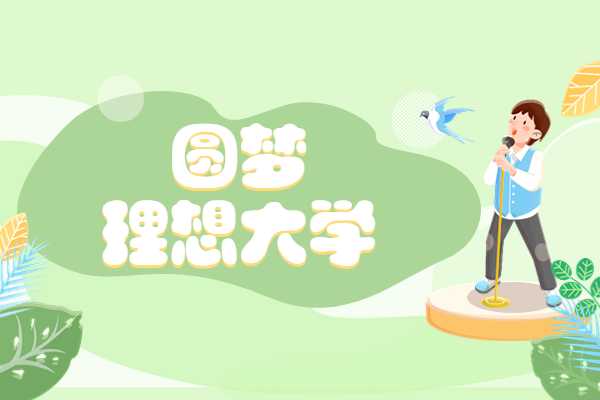 三桥附近有补习学校吗?口碑怎么样?教学风格呢?西安的补习学校多吗?在西安三桥附近,有没有补习学校呢?西安伊顿补习学校的口碑怎么样?西安本地学生一般会选择哪家补习学校进行学习?西安伊顿补习学校的教学风格是什么?对于西安的学生和家长来说,大家关于补习学校的疑问总是很多,本篇文章就和小编一起来相关情况。 一、西安三桥附近有没有补习学校? 在西
三桥附近有补习学校吗?口碑怎么样?教学风格呢?西安的补习学校多吗?在西安三桥附近,有没有补习学校呢?西安伊顿补习学校的口碑怎么样?西安本地学生一般会选择哪家补习学校进行学习?西安伊顿补习学校的教学风格是什么?对于西安的学生和家长来说,大家关于补习学校的疑问总是很多,本篇文章就和小编一起来相关情况。 一、西安三桥附近有没有补习学校? 在西
-
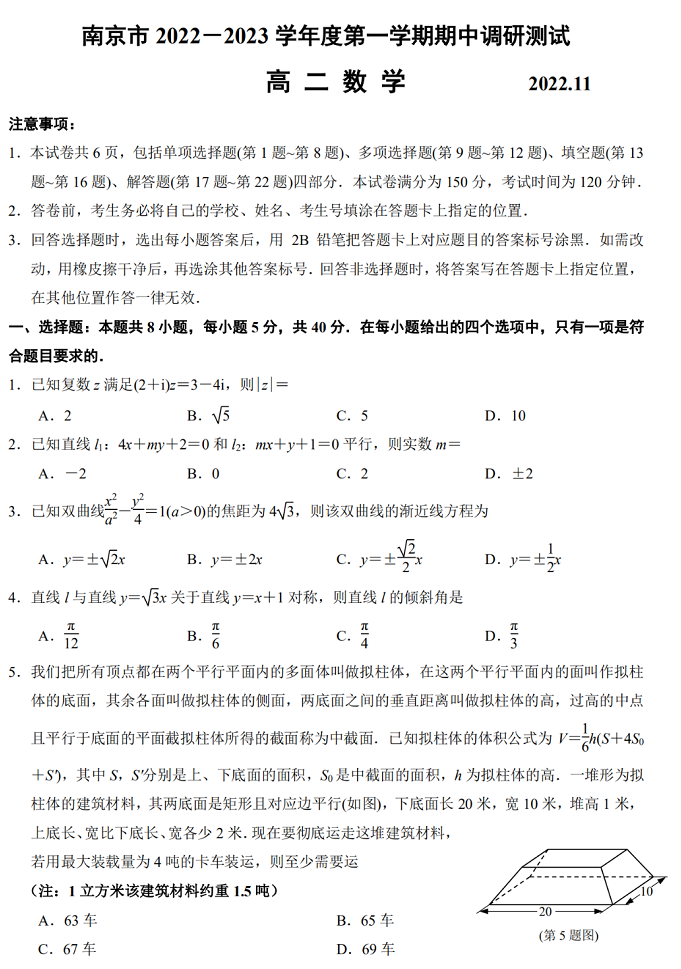 南京市2022-2023年高二上学期期中考试数学试卷含答案南京市高二学生进行了2022-2023年第一学期中考试,小编整理到了这次考试的数学试卷及答案,在这篇文章里面分享给同学们。咱们高二学生或者是江苏其他城市的高二学生们也可以看一看、做一做,对自己的知识进行一个复习,对自己做一个检测。 南京市2022-2023年高二上学期期中考试数学试卷
南京市2022-2023年高二上学期期中考试数学试卷含答案南京市高二学生进行了2022-2023年第一学期中考试,小编整理到了这次考试的数学试卷及答案,在这篇文章里面分享给同学们。咱们高二学生或者是江苏其他城市的高二学生们也可以看一看、做一做,对自己的知识进行一个复习,对自己做一个检测。 南京市2022-2023年高二上学期期中考试数学试卷 -
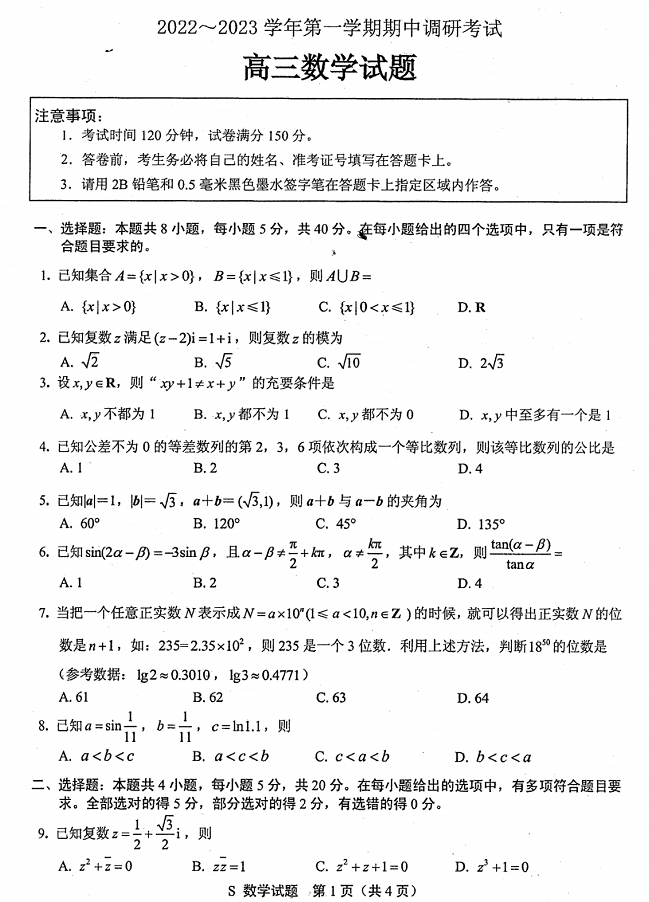 江苏省连云港市2022-2023年上学期高三期中考试数学试卷及答案近日江苏的很多城市的高三学校都进行了2022-2023年上学期期中考试,主要是对高三学生从开学到现在这么长时间学习情况的一个调查。下面是江苏省连云港市2022-2023年上学期高三期中考试数学试卷及答案,伊顿教育小编整理出来跟大家进行分享。 江苏省连云港市2022-2023年上学期高三
江苏省连云港市2022-2023年上学期高三期中考试数学试卷及答案近日江苏的很多城市的高三学校都进行了2022-2023年上学期期中考试,主要是对高三学生从开学到现在这么长时间学习情况的一个调查。下面是江苏省连云港市2022-2023年上学期高三期中考试数学试卷及答案,伊顿教育小编整理出来跟大家进行分享。 江苏省连云港市2022-2023年上学期高三 -
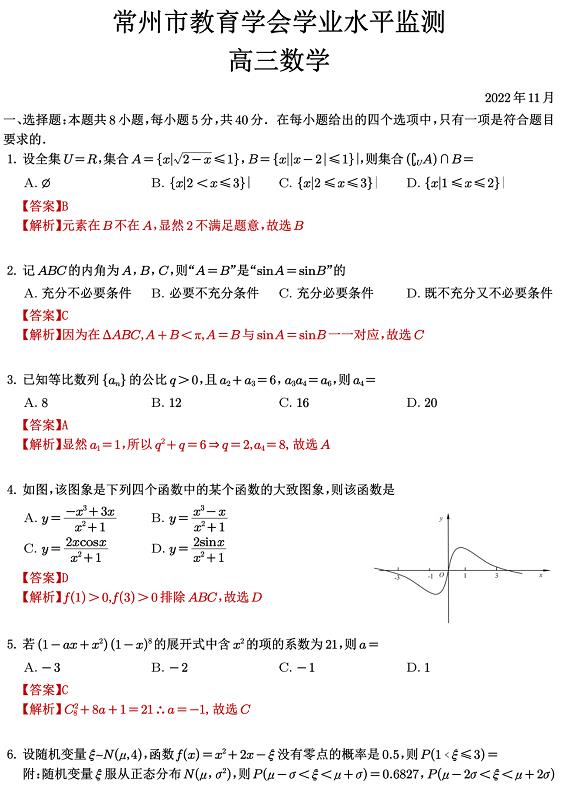 常州市2023届高三期中联考数学试卷及答案解析近期江苏省一些城市的高三学生们已经开始了期中考试,下面是小编整理的常州市2023届高三期中联考数学试卷及答案解析,虽然考试已经考完了,但是你们还是可以看再看一下的。另外咱们江苏其他城市的高三学生们也可以做一下常州市今年高三期中联考的数学试卷,看看自己得多少分。 常州市2023届高三期中
常州市2023届高三期中联考数学试卷及答案解析近期江苏省一些城市的高三学生们已经开始了期中考试,下面是小编整理的常州市2023届高三期中联考数学试卷及答案解析,虽然考试已经考完了,但是你们还是可以看再看一下的。另外咱们江苏其他城市的高三学生们也可以做一下常州市今年高三期中联考的数学试卷,看看自己得多少分。 常州市2023届高三期中 -
 2023南京高三零模 南京市2023届高三零模数学试卷及答案解析随着高三开学,南京市迎来了高三零模考试,正式进入高三的模考,这次零模考试不知道广大高三学子们考的怎么样呢?以下是小编为大家整理的2023届南京市高三零模考试的数学试卷及答案解析,欢迎大家来查漏补缺。 2023南京高三零模 南京市2023届高三零模数学试卷及答案解析
2023南京高三零模 南京市2023届高三零模数学试卷及答案解析随着高三开学,南京市迎来了高三零模考试,正式进入高三的模考,这次零模考试不知道广大高三学子们考的怎么样呢?以下是小编为大家整理的2023届南京市高三零模考试的数学试卷及答案解析,欢迎大家来查漏补缺。 2023南京高三零模 南京市2023届高三零模数学试卷及答案解析

















